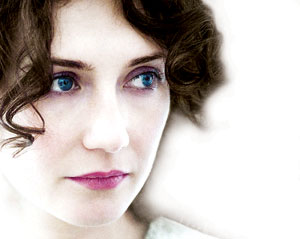 |
Ingrid Jonker is often called the South African "Sylvia Plath". The similarities are obvious; the two were precocious, headstrong women poets, both of whom committed suicide at a young age. Jonker, born in 1933 in South Africa, wrote in the Afrikaans language and lived a turbulent life often on the brink of poverty. After publishing a series of critically acclaimed poetry collections, she walked into the ocean and drowned herself in 1965 at the age of 31.
The film Black Butterflies, directed by Paula van der Oest, is titled after a fragment of one of Jonker's earlier poems, and is a heart-wrenching film chronicling the life of this troubled and brilliant poet. Few people have heard of her today, poetry being the fastest waning art of the 21st century, yet Jonker's legacy is treasured in her home country: an example being that Nelson Mandela quoted from her poem The child (who was shot dead by soldiers at Nyanga), in Afrikaans, during his opening speech at the first South African democratic parliament on 24 May, 1994.
(On a side note, watching film after film trying to find something worthy to write about during three interminable days of bandas, I couldn't help but think about the importance of words, poetry or prose, in the fight for civil rights. Call it what you may, our current struggle for ethnic parity is just as much a civil rights issue now as apartheid was then).
The main drama of the film starts with Ingrid's early adulthood at which point she had already been married, with one daughter, Simone, and separated from her husband Pieter Venter. Jonker is impatient, impulsive and straightforward about her relationships with men, discarding Pieter, and starting an affair with another writer, Jack Cope, who is much older, and who is to become an important person in her life.
As the film develops we are confronted with a woman battling her many demons: her father, from whom she always seeks approval (another similarity to Plath, whose father, however, died while she was eight years old), and her struggles with the men with whom she is intimate. On one hand, Jonker is fiercely independent, a forward thinking activist who is unafraid to speak out against the horrifying status quo, and on the other hand, she is a messy alcoholic - always afraid of being abandoned.
Yet Jonker's talent never deserts her � it is clear that she has an amazing facility with poetry, able to channel her emotions and observations into her art, always using new, striking, resonant turns of phrase. That is, until she is admitted to a Paris sanatorium on a trip to Europe for electro-shock therapy brought on by a nervous breakdown. Upon returning home she tells Jack, "I can't write any more".
Shortly after, she takes her own life.
Perhaps the most compelling aspect of Black Butterflies is its unflinching portrayal of Ingrid's character and her tendency towards instability. There is a fascinating and disturbing link between genius and madness, or a certain mental fragility. A surplus of creativity so often goes hand in hand with periods of manic depression - there are any number of examples, from Van Gogh to Rothko and Plath, that one might quote. While not in any way a scientific fact, it is undeniably unsettling to think of the scores of legendary figures through the centuries who have been afflicted by this very distinctive malaise.
Ingrid struggled with her weaknesses, yet it is clear from the film and with the help of Carice van Houten's brave and vulnerable performance as Yonker, that despite being dealt a losing hand, this singular woman struggled to create her art, speak the truth, fight against Apartheid, and remained indelibly in the hearts and minds of her friends and lovers as a brilliant and ground-breaking poet.
All DVDs reviewed in this column are available at: Music and Expression, Thamel, Phone # 014700092


